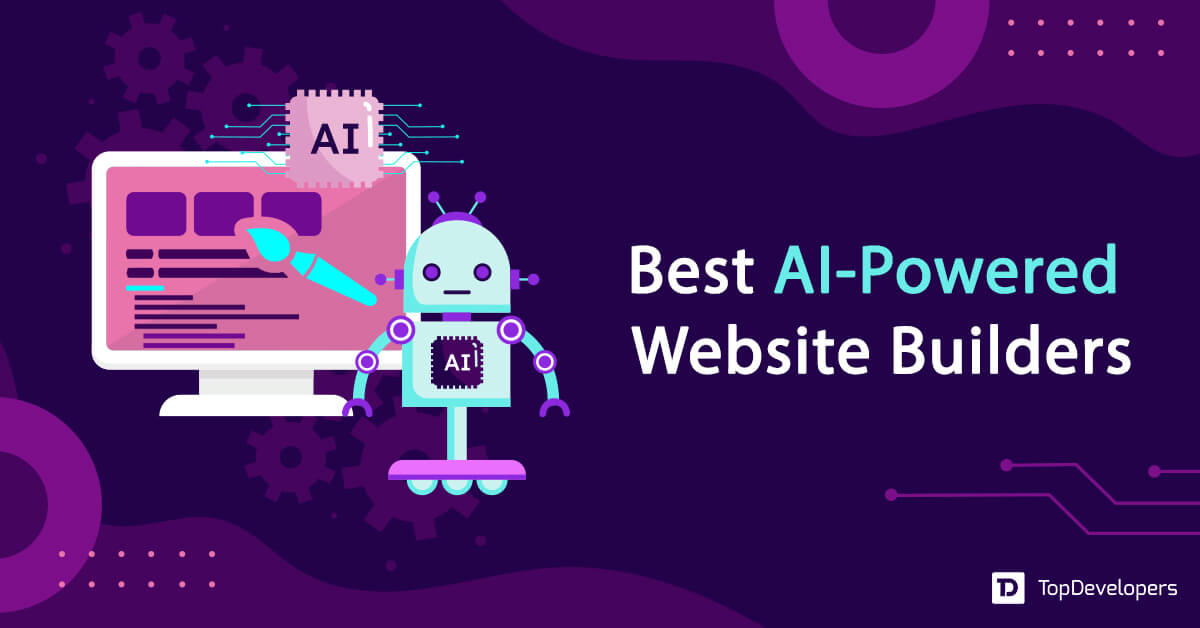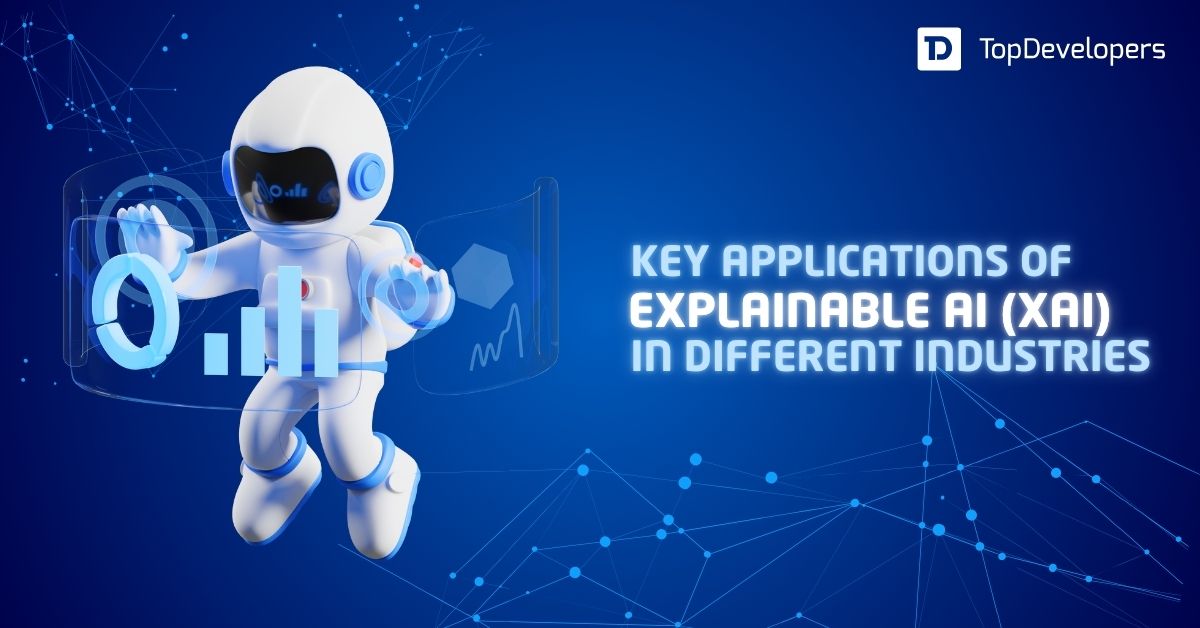
Artificial intelligence is not only a notion these days. Real companies all around the world run on this working technology nowadays. From retail and healthcare to banking and logistics, artificial intelligence is saving teams time, streamlining processes, and better serving consumers.
By 2025, estimates place the worldwide artificial intelligence industry at 196.63 billion USD. Companies have adopted the technology quickly, as evidenced by the 36.6 percent every year until 2030. This expansion transcends mere numbers on paper. For instance, more than eighty percent of Netflix’s viewing activity originates from artificial intelligence recommendations guiding consumers toward beloved content.
Furthermore, heavily influencing web development is artificial intelligence. It is altering the construction, upkeep, and enhancement of websites. About 45% of IT experts In a 2025 survey by Statista conducted by a polling organization, 45% of IT experts claimed that they use artificial intelligence tools daily to expedite their jobs. Tools like GitHub Copilot enable developers to code faster and better. Concurrently, artificial intelligence systems are enabling non-technical users to easily create feature-rich websites.
This blog will show you how artificial intelligence is changing web building. We will review actual case studies, useful technologies, and forthcoming trends that will enable you to keep competitive online and build better websites.
Table of Contents
Ways to Use AI in Web Development
Thanks to process simplification and improved user experiences, artificial intelligence has transformed web development. The following are some main ways artificial intelligence is changing the field:
-
Coding Assistance
By recommending code snippets, autocompleting lines, and pointing out possible flaws, AI-powered applications like GitHub Copilot and Tabnine help engineers. The result speeds up the development process and enhances code quality so that creators may concentrate more on creativity than on daily chores.
For common activities, for instance, GitHub Copilot can cut coding time by up to 55%, according to OpenAI in a user study.
-
Automated Testing
AI automates tasks including UI testing, cross-browser compatibility checks, and regression testing; therefore, it simplifies testing. Tools like Selenium with AI integrations and Testim guarantee the seamless operation of web apps and help rapidly identify flaws.
A 2025 Forrester study estimates that automated testing lowers time-to-market by up to 30%.
-
Website Design Optimization
AI-driven systems like Wix ADI and Adobe Sensei examine user behavior to propose layout changes, content placement optimization, and customized experiences. These tools guarantee webpages are not only aesthetically pleasing but also easily navigable.
Through automated design recommendations, Adobe Sensei helped a retail brand boost click-through rates by 27%.
-
Content Generation
Blog entries, product descriptions, and meta tags are among the SEO-optimized content produced by AI writing tools like Jasper and Writesonic. This type of work saves time and money and helps companies keep current and relevant material.
Pro Tip: Content generation using artificial intelligence guarantees uniform tone and style on your website.
-
Predictive Development
AI forecasts possible problems and offers remedies before they develop by examining past data. Early addressing of issues by proactive developers helps to lower downtime and increase productivity.
For instance, artificial intelligence forecasting systems can spot increases in server load and suggest changes to stop website failures.
-
Smart Chatbots for Personalized User Experiences
Real-time user engagement using AI-powered chatbots such as Ada, ChatGPT, and Zendesk yields custom answers to questions. These chatbots improve user happiness and lighten the workload of customer care staff.
Insight: Gartner’s 2025 research shows that AI chatbots can answer up to 80% of regular questions, hence greatly speeding response times.
-
Voice-Based Interactions
Voice search and navigation tools made possible by artificial intelligence give users a hands-free, simple interface. Voiceflow and other tools let designers smoothly includeh. Trend: The projection that 50% of all web searches will be voice-based by 2025 highlights the need for this function.
need for this function.
-
Artificial Design Intelligence (ADI)
By evaluating consumer preferences and industry norms, platforms like Bookmark and Wix ADI use artificial intelligence to automate website building. In only minutes, ADI can create whole websites, from layouts to functionality.
For non-technical people, ADI tools are perfect since they enable them to construct professional websites without knowing any coding.
Benefits of Integrating AI in Web Development
Through faster, smarter, more user-oriented procedures, artificial intelligence is revolutionizing web development. Including artificial intelligence in web development offers the following main advantages:
-
Increased Development Speed and Efficiency
By automating monotonous processes such as code development and testing, artificial intelligence frees web developers to concentrate on strategic and creative elements of projects. Faster project deliveries, less development time, and streamlined processes made possible by automation help ease workloads.
-
Enhanced Code Quality
AI technologies‘ real-time debugging and error detection guarantee better, more consistent code. AI reduces the possibility of mistakes entering production by identifying problems during the development phase, which leads to the production of better software.
-
Personalized User Experiences
By means of user behavior and preferences analysis, artificial intelligence helps websites to provide customized information and recommendations. AI-driven adaptive interfaces give users experiences that seem tailored, therefore enhancing loyalty and pleasure and acting as a catalyst.
-
Faster Development Cycles
For new features and websites, automating coding, testing, and deployment drastically lowers time-to-market.
-
Improved Code Quality
AI finds flaws, recommends fixes, and enforces best practices—all of which produce cleaner, more dependable code.
-
Enhanced User Experience
Websites become more captivating and user-friendly with personalization, dynamic content, and responsive interfaces.
-
Cost Efficiency
AI reduces development and maintenance expenses by automating manual chores and optimizing processes.
-
Scalability and Performance
AI-driven optimization guarantees websites operate under high loads and instantly react to changing user needs.
AI in Web Development: Challenges and Considerations
-
Ensuring Data Privacy and Security
Maintaining confidence and safeguarding user data depend on following laws, including GDPR and CCPA. Making sure these rules are followed promotes openness in data management techniques and helps stop data breaches.
-
Addressing Ethical Concerns
used to train AI algorithms can impact them, leading to unexpected consequences in content development. This difficulty emphasizes the need for routinely evaluating artificial intelligence systems to reduce prejudice and guarantee justice.
-
Continuous Learning Curve
Rapid evolution of artificial intelligence technology demands developers to remain current with new tools and frameworks. Maintaining efficiency in web development processes and keeping up with developments depend on constant education and adaptation.
Future Trends in AI and Web Development
As artificial intelligence develops, its influence in web development is growing in innovative ways. The following major developments will help define artificial intelligence’s course in web development:
-
AI Agents for Complex Web Tasks
Beyond basic automation, artificial intelligence agents are handling challenging web development chores. Full-stack operations—including project planning, resource allocation, and task management—can be assisted by these tools. Integrating AI agents into processes helps developers save time and concentrate on more strategic activities, thereby improving web development with AI more than it has ever been possible.
-
Advancements in Natural Language Processing (NLP)
Natural language processing (NLP) is improving the user interface of websites. AI-powered conversational interfaces let users easily navigate websites, ask questions, and get tailored answers. Furthermore, increasingly essential for user involvement are voice-based interactions, which let users search and interact with websites with voice commands.
-
Responsive and Adaptive Web Design
Artificial intelligence-driven frameworks are transforming web design by constantly changing layouts and content based on user preferences and behavior. To produce extremely customized and responsive designs, these frameworks examine real-time data, including device type, browsing behavior, and location. Driven by AI in web design, this approach guarantees that websites stay aesthetically pleasing and functionally effective on all kinds of devices.
-
Personalization at Scale
By means of customized content, recommendations, and adaptive interfaces derived from AI analysis of user data, artificial intelligence increases engagement and happiness.
-
Conversational Interfaces
Real-time support offered by AI-powered virtual assistants and chatbots enhances customer service and lowers running expenses by means of operations.
-
Voice search and multilingual capabilities
As voice searching becomes more popular, artificial intelligence helps maximize material for spoken searches and provides immediate translation, thereby increasing worldwide reach.
-
Automation of Repetitive Tasks
By automating coding, testing, and deployment, artificial intelligence frees engineers to concentrate on creative and challenging problem-solving.
-
Predictive Analytics & Security
Through danger identification before they become more serious, machine learning models predict traffic spikes, find anomalies, and improve security.
Conclusion
From a futuristic concept to a fundamental component of modern web development, artificial intelligence (AI) has transformed the way websites are produced, improved upon, and enjoyed. From automated basic coding chores to improving user interaction with tailored content, artificial intelligence has transformed every phase of the web development process Powerful artificial intelligence techniques are now available to speed up processes and improve the quality of the final result.
Adopting artificial intelligence is not optional as the scene of web development gets more competitive. It is rather necessary. Using AI-driven tools and technologies helps web development companies to produce creative, efficient, user-centric websites that satisfy current consumers. AI is the secret to staying ahead, whether your initiatives are future-proof with predictive capabilities, designed for personalization, or speed-oriented optimization.
Adopting artificial intelligence in web development is your pass to creating smarter, faster, and more captivating digital experiences in a world where innovation drives success. All set to leap forward? Discover how the leading artificial intelligence tools and techniques can change your web development path right now.
FAQs
1. What is AI web development and how is it transforming websites?
AI web development refers to using artificial intelligence to streamline design, automate coding, enhance UX, and personalize content. AI-driven tools improve efficiency, reduce manual errors, and enable smarter decision-making, making web development faster and more adaptive to user needs.
2. What are the top AI tools for developers in web development?
Popular AI tools for developers include GitHub Copilot, TensorFlow, ChatGPT, Wix ADI, and Adobe Sensei. These tools help automate coding, generate content, optimize design, and improve UX—making AI an essential asset in modern web development workflows.
3. What are the current web development trends involving AI?
Key web development trends include AI-powered chatbots, voice search optimization, AI-generated content, smart coding assistants, and predictive UX. These trends reflect a shift toward automation, personalization, and more intelligent, responsive web design.
4. What are the main benefits of AI in web development?
The benefits of AI in web dev include faster development cycles, better personalization, real-time data analysis, enhanced UX, and reduced costs. AI streamlines tasks, supports decision-making, and ensures websites are more intuitive and user-friendly.
5. What challenges and future impacts come with AI-driven web design?
AI-driven web design faces challenges like data privacy, algorithm bias, and the need for human oversight. However, its future impact includes hyper-personalized experiences, smart automation, and seamless integrations that redefine how websites are built and used.
 Avantika Shergil
| May 12, 2025
Avantika Shergil
| May 12, 2025
Avantika Shergil is a technology enthusiast and thought leader with deep expertise in software development and web technologies. With over 8 years of experience analyzing and evaluating cutting-edge digital solutions, Avantika has a knack for demystifying complex tech trends. Her insights into modern programming frameworks, system architecture, and web innovation have empowered businesses to make informed decisions in the ever-evolving tech landscape. Avantika is passionate about bridging the gap between technology and business strategy, helping businesses build customized software and website, and understand about different tools to leverage effectively for their ventures. Explore her work for a unique perspective on the future of digital innovation.





